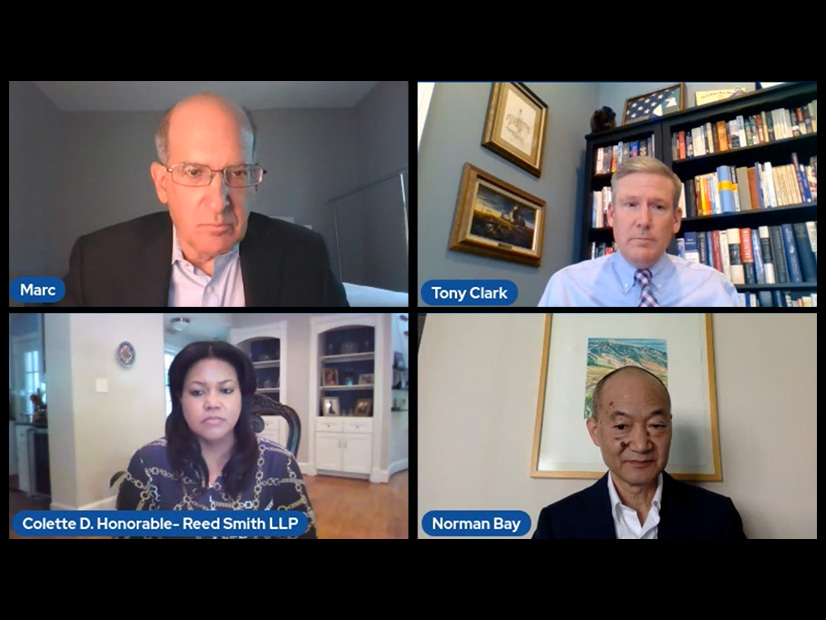When FERC Chair Richard Glick announced the creation of a new senior position to incorporate environmental justice and equity concerns into the commission’s decision-making process, he wanted to ensure these areas “finally get the attention they deserve.”
Four former commissioners discussed this and other FERC issues under President Biden during a panel Wednesday for the Energy Bar Association’s annual meeting and conference, which was virtual this year.
Marc Spitzer, a FERC commissioner from 2006 to 2011, said that during the 2020 U.S. presidential election, the Biden campaign seemed focused on three issues: COVID-19, climate and energy, and racial injustice, which he said are aligned and combined with environmental justice.
Colette Honorable, commissioner from 2014 to 2017, said the commission has experience working on issues related to health disparities when it does its environmental reviews of energy facilities in low-income or rural communities.
“So much of it is about being proactive and being thoughtful about how we do this work and in the communities that we serve,” said Honorable, a member of Reed Smith’s energy and natural resources group. “I think we will all be looking to FERC to provide certainty, guidance and best practices.”
Honorable gave a “tip of the cap” to another panelist, former FERC Chair Norman Bay, who suggested best practices for developing energy projects when he led the commission.
Office of Public Participation
Tony Clark, commissioner from 2012 to 2016 and currently a senior adviser for energy and telecommunications clients at the law firm Wilkinson Barker Knauer, said the efficacy of the Office of Public Participation (OPP) is largely going to depend on “if it can better facilitate information both ways from communities of interest.”
“The thing that the commission will need to make sure that it guards against is it just doesn’t become sort of another office of bureaucracy and more red tape in a process that honestly has a lot of red tape in it right now,” Clark said. “When you talk about certification of large projects, to me, that’s the opening and opportunity to facilitate greater information flow.”
During a “listening session” in March, landowners across the country told FERC they doubted OPP would improve the decision-making process for natural gas infrastructure. The vast majority of these were landowners who fought with gas companies exercising eminent domain to build pipelines, compressor stations and LNG facilities. (See Public Skeptical of New FERC Participation Office.)
Transmission
As carbon-reduction mandates drive the electrification of the building, heating and transportation sectors, there will be a need for additional transmission. Bay said that everyone on the panel “has had to grapple with the difficulties in getting transmission built.” There are three interrelated and recurring problems with transmission for FERC, according to Bay.
“There’s siting over which FERC has almost no authority,” Bay said. “There’s cost allocation, which is always difficult because people recognize the benefits of transmission, but no one wants to pay.” And the third problem is planning.
“We’ve got Order 1000, which has now been on the books for a decade, and I think everyone on the commission would probably agree that it has not lived up to its lofty promise, and particularly with interregional planning,” Bay said.
He noted that the Biden administration is trying to achieve zero carbon emissions by 2035; there is about 38% carbon-free electricity right now.
“If you’re trying to close over the next 14 years, there’s no way you’re going to do that without transmission, so I think the challenge is pretty clear for the commission,” Bay said. “I think there are things that it can do under Order 1000 to try to speed things along.”




